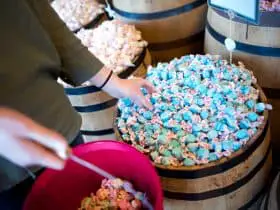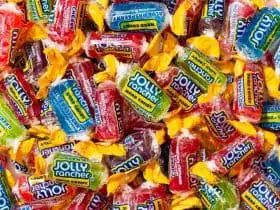So, it’s finally time for a long-awaited movie night, and as you roam the supermarket aisles, you find a familiar red packaging; Twizzlers! Maybe they were your childhood favourite candy, or you just discovered them recently and wanted to try them. Whatever it is, you read the ingredients list. Bingo! All the ingredients are plant-based, with gelatin nowhere to be found.
Still, you find yourself hesitant to put this candy in your cart. I mean, do you really know how palm oil is made? What about artificial colours?
In this article, I’ll break down the ingredients found in Twizzlers so you could have a guilt-free movie night with all your favourite vegan snacks. So, let’s get started!
What Are Twizzlers?
Twizzlers are one of the most popular American candy brands, classified as liquorice-like candies. Why so? Out of its numerous flavours, the only one that actually contains liquorice extract is the Black liquorice flavour.
The first pack of Twizzlers dates back to 1929, where it was produced in Lancaster, Pennsylvania, at which point it was first popularized as a snack for movie-goers.
Its twisted shape, which most resembles a helix, might be one of the reasons for its immense popularity, as well as the fact that it’s low-fat. It’s also much easier to carry around and eat whenever you please since it preserves its shape and won’t melt like other candies, such as chocolate.
Still, are Twizzlers vegan? The short answer is yes. Twizzlers are, in fact, vegan. So you might be wondering, why go on with this article? Well, although none of the ingredients listed on a Twizzler’s package are animal-derived, that still doesn’t mean that some of these ingredients aren’t questionable.
You see, some vegans might still consider Twizzlers not safe to consume due to the method by which some of these ingredients are obtained, while for others, the fact that the ingredients aren’t derived from animals is simply enough.
It all comes down to each person’s personal opinions, so there’s no exact right or wrong answer. Still, below I’ll discuss these debatable ingredients so you could decide for yourself whether or not you’d keep this candy in your snack bar.
- Contains one (1) 80-ounce container of TWIZZLERS Twists Strawberry Flavored Chewy Candy
Prices pulled from the Amazon Product Advertising API on:
Product prices and availability are accurate as of the date/time indicated and are subject to change. Any price and availability information displayed on [relevant Amazon Site(s), as applicable] at the time of purchase will apply to the purchase of this product.
Debatable Ingredients
One of the first ingredients that people search for when determining whether or not a product is vegan is gelatin. Thankfully, gelatin is nowhere to be found in the ingredients list for Twizzlers, but that doesn’t immediately mark this candy as vegan. So, let’s take a look at some controversial ingredients found in Twizzlers that could raise some concerns.
Palm Oil

There’s no doubt that palm oil is technically vegan since it’s derived from palm plants. Yet, some vegans might take issue with its consumption due to the way it’s manufactured.
The production of palm oil involves creating palm oil plantations that require removing several acres of rainforests, which takes a toll on the environment and leads to the destruction of the habitats of certain animals. In turn, this also leads to a decline in animal populations in rainforests.
Some vegans might consider the consumption of any products that contain palm oil to contribute to deforestation directly and sometimes even the displacement of native populations, which is why they’d avoid Twizzlers altogether.
Glycerin
Glycerin is a by-product of soap manufacture, mainly using animal fat, but let’s not immediately cross it off as non-vegan.
Glycerin could either be derived from animals or plants, but Twizzlers’ packaging doesn’t list which one. The good news is, Twizzlers are owned by The Hershey Company, which lists its glycerin as a product made from various vegetable oils.
Sugar
Sugar is a topic of debate when it comes to Twizzlers for two main reasons; the first one actually has nothing to do with whether or not it’s vegan. Despite being low in fat, Twizzlers are incredibly high in their sugar content.
Only one small twist contains about4.8 grams of sugar, which amounts to around 19 grams of sugar in a single serving of four pieces. Let’s be real; who stops at four twists? Consequently, the incredible amount of sugar involved in manufacturing Twizzlers could mean that they require sugar from multiple sources.
There are usually two types of sugar involved in making candies; cane sugar and beet sugar. Beet sugar is safe as it’s derived from sugar beets, so it doesn’t include any type of animal products in its filtration process.
On the other hand, cane sugar is derived from sugarcane, and it could be filtered over bone char, which is derived from the bones of cattle. While there are no animal bones found, some vegans might still consider this manufacturing process as non-vegan.
There’s still a possibility that the refined cane sugar involved in making Twizzlers is vegan, as some manufacturers use alternatives to bone char such as activated charcoal. Still, Hershey’s doesn’t specifically mention how their sugar suppliers make cane sugar.
Artificial Colours
The first thing that might pop into your head when reading “artificial colours” is none other than carmine. For those unfamiliar, carmine is a type of red dye derived from insects, so there’s no debate about whether or not they’re vegan. The good news is, the red dye used to give the famous red colour for Twizzlers isn’t made from carmine.
In fact, none of the various flavours of Twizzlers contain any animal-derived artificial colours. So, where’s the issue? You see, Red 40, which is found in almost all Twizzler flavours, is made synthetically, yet it’s often tested on animals.
With numerous other animal-safe testing methods found in this day and age, it can be challenging for some vegans to imagine why manufacturers would still use animals for testing products. So, if this is something that’s a deal-breaker for you as a vegan, it’s best to avoid Twizzlers.
Mono-and Diglycerides
The main problem with these two ingredients is that they contain glycerol, which could come from either plant or animal sources. Unfortunately, there’s no way to know precisely which source the glycerol in these ingredients comes from.
Usually, manufacturers could have “vegetable diglycerides” on their ingredients list to clearly showcase that the glycerides used in manufacturing this product are plant-based. Still, the packaging on Twizzler packs doesn’t communicate that, so it’s hard to tell.
Besides, there’s some controversy surrounding plant-based glycerides. Palm oil, which is a significant contributor to deforestation, is one of the main plant sources of glycerol.
What About GMOs?

Genetically Modified Organisms (GMOs) are another cause of concern for some people. That’s because GMOs are organisms that had their DNA artificially manipulated in order to give a specific property.
So, are Twizzlers GMO-free? Unfortunately, they aren’t. Two main ingredients in Twizzlers could cause some concern, the first being citric acid. While citric acid is wholly derived from fruits and is 100% vegan, it’s still possible that it’s made from GMO crops.
Since a significant percentage of the export of citric acid that arrives in the US comes from China, there’s a high chance that the fruits used in manufacturing it are genetically modified. This doesn’t mean that the citric acid involved in making Twizzlers isn’t GMO-free, but there’s no way to know for sure.
The second ingredient, which is potato starch, for sure classifies Twizzlers as non-GMO-free. Sadly, potato starch is at least 50% GMO.
Heart Disease Risk
One thing that’s been a significant concern for both vegans and non-vegans alike when it comes to Twizzlers is whether or not the liquorice involved in their manufacturing is healthy for consumption.
Well, for starters, only the Black Liquorice flavour contains liquorice. The rest of the flavours don’t have that ingredient, which is why I referred to Twizzlers at the beginning of this article as “liquorice-like” candies, and it’s also what they’re known as in general.
Black liquorice was found to be risky to consume in large amounts as it poses the risk of causing high blood pressure, irregular heart rhythm, and muscle weakness. It was found to be unsafe, particularly for people over the age of forty years old with a history of high blood pressure or heart disease.
In general, it’s safe to consume black liquorice in small amounts over a considerable period of time. On the other hand, black liquorice found in medicines is safe to consume in large quantities.
Final Thoughts
It can be hard to make up your mind about whether or not you’d consume Twizzlers. Since they don’t precisely contain animal-derived products, it all boils down to your own opinion on what you’d consider vegan and what you wouldn’t.
There’s no right or wrong way to be vegan. All we can do is learn more and try to stay informed about the ingredients and methods that go into making our food. As long as you’re doing your part to leading a cruelty-free life, then you’re on the right track.












Leave a Reply